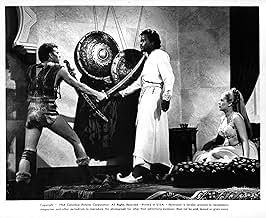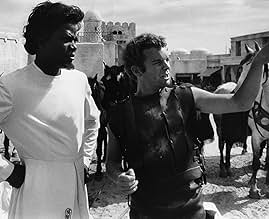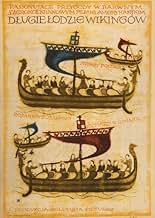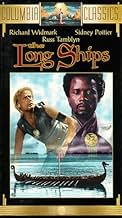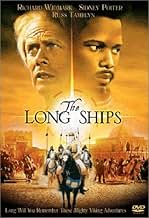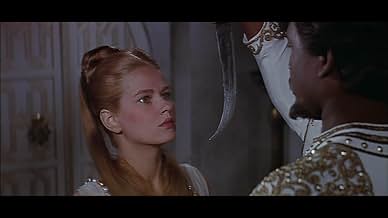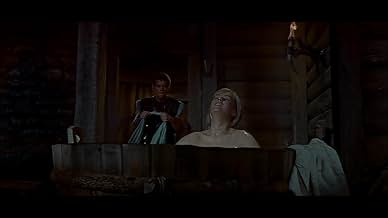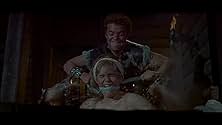IMDb RATING
6.0/10
3.3K
YOUR RATING
A vagabond Viking adventurer and a Moor both compete to find "The Mother of All Voices", a legendary golden bell near the Pillars of Hercules.A vagabond Viking adventurer and a Moor both compete to find "The Mother of All Voices", a legendary golden bell near the Pillars of Hercules.A vagabond Viking adventurer and a Moor both compete to find "The Mother of All Voices", a legendary golden bell near the Pillars of Hercules.
- Director
- Writers
- Stars
- Nominated for 1 BAFTA Award
- 1 nomination total
Beba Loncar
- Gerda
- (as Beba Lončar)
Peter Brace
- Viking
- (uncredited)
- Director
- Writers
- All cast & crew
- Production, box office & more at IMDbPro
Featured reviews
The Long Ships is a rather unremarkable Viking adventure, barring one scene that involves an eye-wateringly nasty method of execution called 'The Mare of Steel'; I haven't seen this film since I was a child, but I can still vividly recall how the poor vikings were sent to their gruesome death, sliced down the middle while sliding down the Mare's large and wickedly sharp blade.
Except that this isn't what happens, as I have just found out by at long last revisiting the film. Over the years, my memory has been deceiving me: the scene in question is extremely tame, only one person, a Moorish guard, riding the Mare, his demise not in the least bit graphic, making the film as a whole quite the disappointment.
The humdrum story sees ruffian Rolfe (Richard Widmark) leading a group of scrawny Viking warriors on a quest to find a fabled bell made of solid gold. Also looking for the bell is Moorish king Aly Mansuh (Sidney Poitier), who isn't about to let the pale northerners steal his prize.
Poorly executed action scenes rub shoulders with moments of embarrassingly bad slapstick comedy (the raucous vikings' wild antics—drinking, brawling and raping—are played for laughs), leading to an uneven film that lacks the rousing sense of adventure to be found in the earlier Hollywood viking epic The Vikings (1958).
A usually reliable cast do little to distinguish this mediocre romp, Poitier clearly not taking matters seriously judging by his ridiculous James Brown hairdo, Widmark and Russ Tamblyn (as Rolfe's younger brother Orm) failing to put any swash into their buckling, and Brit comic actor Lionel Jeffries camping it up in black-face as an effete eunuch!
And don't even get me started on the film's many goofs, which include the massive bell being towed on a raft (which would sink immediately under the weight of all that gold), Rolfe seemingly able to swim from the Barbary coast to Scandinavia, and the small matter of who has been ringing the bell all this time and why (the rocky outcrop on which it is found being totally deserted).
My rating: 5 deafening golden bell bongs out of 10. Moderately entertaining, but mostly for the wrong reasons.
Except that this isn't what happens, as I have just found out by at long last revisiting the film. Over the years, my memory has been deceiving me: the scene in question is extremely tame, only one person, a Moorish guard, riding the Mare, his demise not in the least bit graphic, making the film as a whole quite the disappointment.
The humdrum story sees ruffian Rolfe (Richard Widmark) leading a group of scrawny Viking warriors on a quest to find a fabled bell made of solid gold. Also looking for the bell is Moorish king Aly Mansuh (Sidney Poitier), who isn't about to let the pale northerners steal his prize.
Poorly executed action scenes rub shoulders with moments of embarrassingly bad slapstick comedy (the raucous vikings' wild antics—drinking, brawling and raping—are played for laughs), leading to an uneven film that lacks the rousing sense of adventure to be found in the earlier Hollywood viking epic The Vikings (1958).
A usually reliable cast do little to distinguish this mediocre romp, Poitier clearly not taking matters seriously judging by his ridiculous James Brown hairdo, Widmark and Russ Tamblyn (as Rolfe's younger brother Orm) failing to put any swash into their buckling, and Brit comic actor Lionel Jeffries camping it up in black-face as an effete eunuch!
And don't even get me started on the film's many goofs, which include the massive bell being towed on a raft (which would sink immediately under the weight of all that gold), Rolfe seemingly able to swim from the Barbary coast to Scandinavia, and the small matter of who has been ringing the bell all this time and why (the rocky outcrop on which it is found being totally deserted).
My rating: 5 deafening golden bell bongs out of 10. Moderately entertaining, but mostly for the wrong reasons.
They say you shouldn't re-visit things you dug when you were a kid, because you'll be disappointed. I remember being blown away by 'The Long Ships' on b/w TV when I was about 8, and I knew that the film wasn't going to live up to my memories - but it could have been a lot, lot worse.
'The Long Ships' was made at the tail end of the historical togas and sandals epics of the fifties and early sixties, and it doesn't take itself anywhere near as seriously as 'Ben Hur', 'El Cid' or 'The Egyptian'. It's basically a good old adventure yarn, and it's still actually a load of fun, even if it gets a bit bogged down in the middle.
Richard Widmark is a Viking (only slightly more ridiculously than his nemesis Sidney Poitier as a Moor) who is shipwrecked and thinks he has found the location of the fabled 'Mother of Voices' - a gigantic golden bell as tall as 'three tall men', made by monks somewhereorother. In his efforts to capture it he and his crew constantly run up against Poitier who has similar designs. All of this leads to some rather improbably rapid voyages from one end of Europe to the other, apparently accomplished overnight - but the film makers obviously didn't give a lot of priority to plausibility, and neither should the viewer.
Widmark plays his hero more like Indiana Jones than Ben Hur. There is a good deal of comedy, and a couple of scenes even feel like they belong in a 'Carry On' movie (particularly the scene where the Vikings bust into the Harem, which might have been offensive if it wasn't so deliberately slapstick).
Sure, it's an adventure drama, but if you're expecting the sort of grave, Biblical epic which had been popular for most of the previous decade, look somewhere else. 'The Long Ships' is a good old-fashioned adventure yarn, and as such is still pretty good fun; at least as much as modern equivalents like 'The Mummy'. I'm giving it a strong 6.0.
'The Long Ships' was made at the tail end of the historical togas and sandals epics of the fifties and early sixties, and it doesn't take itself anywhere near as seriously as 'Ben Hur', 'El Cid' or 'The Egyptian'. It's basically a good old adventure yarn, and it's still actually a load of fun, even if it gets a bit bogged down in the middle.
Richard Widmark is a Viking (only slightly more ridiculously than his nemesis Sidney Poitier as a Moor) who is shipwrecked and thinks he has found the location of the fabled 'Mother of Voices' - a gigantic golden bell as tall as 'three tall men', made by monks somewhereorother. In his efforts to capture it he and his crew constantly run up against Poitier who has similar designs. All of this leads to some rather improbably rapid voyages from one end of Europe to the other, apparently accomplished overnight - but the film makers obviously didn't give a lot of priority to plausibility, and neither should the viewer.
Widmark plays his hero more like Indiana Jones than Ben Hur. There is a good deal of comedy, and a couple of scenes even feel like they belong in a 'Carry On' movie (particularly the scene where the Vikings bust into the Harem, which might have been offensive if it wasn't so deliberately slapstick).
Sure, it's an adventure drama, but if you're expecting the sort of grave, Biblical epic which had been popular for most of the previous decade, look somewhere else. 'The Long Ships' is a good old-fashioned adventure yarn, and as such is still pretty good fun; at least as much as modern equivalents like 'The Mummy'. I'm giving it a strong 6.0.
Considering Kirk Douglas, only five years before, has made of his 'The Vikings' the definitive viking epic, not so bad we could be entertained with a lighthearted version of the norwegian warriors. Sort of a 'comic relief' after the bloody, harsh, moody Douglas unsurpassed masterpiece.
Not to be taken seriously, this one. Directed by Jack Cardiff ('The Vikings' cinematographer), it offers fun, adventure, and a semi-Monty Python approach at times. The plot is the silliest ever, acting is hammy to the best, but what the hell?
The Othelo-tailored moor, cortesy of Sidney Poitier, is straight. The nice Russ Tamblyn makes his best. Rossana Schiaffino is traffic-stopper, jawbreaker, but this is a Richard Widmark's movie from the beginning to the end, because he is the only one who clearly got the point across: he is taken nothing, absolutely nothing, too seriously! He is clearly blinking an eye to all off us viewers all the time, saying: "Relax, folks, it's only a movie! Let's have fun!"
Somewhere in this very picture a given viking sighs: 'there's no real vikings anymore, like in the old times!" Man, they stayed all in the Kirk Douglas' movie, you bet! In this one, just tongue-in-cheek slapstick. Where's my popcorn pack?
Not to be taken seriously, this one. Directed by Jack Cardiff ('The Vikings' cinematographer), it offers fun, adventure, and a semi-Monty Python approach at times. The plot is the silliest ever, acting is hammy to the best, but what the hell?
The Othelo-tailored moor, cortesy of Sidney Poitier, is straight. The nice Russ Tamblyn makes his best. Rossana Schiaffino is traffic-stopper, jawbreaker, but this is a Richard Widmark's movie from the beginning to the end, because he is the only one who clearly got the point across: he is taken nothing, absolutely nothing, too seriously! He is clearly blinking an eye to all off us viewers all the time, saying: "Relax, folks, it's only a movie! Let's have fun!"
Somewhere in this very picture a given viking sighs: 'there's no real vikings anymore, like in the old times!" Man, they stayed all in the Kirk Douglas' movie, you bet! In this one, just tongue-in-cheek slapstick. Where's my popcorn pack?
Every Tale, fable, or legend has a basis in some small fact. In this film called " The Long Ships " we have a Viking reciting a legend which was once told to his people of a great bell which was as high as 'three tall men.' Said to have been created by the monks of Byzantium, in actuality, they had indeed cast one out of solid gold, but was small enough to be handed as a gift to the German emperor, for his personal chapel, during the middle ages. As with most 'fish' stories, the size of the bell grew with each retelling. For this movie, the seekers are Northmen, not Germanic knights as in the original tale. Still, the movie is entertaining enough due to the major stars in it. Here we have, Richard Widmark as Rolfe, a seafaring Viking who is captured by Aly Mansuh, the Moorish prince (Sidney Poitier) who threatens him with torture is he does not reveal its location. Then there is Russ Tamblyn as Orm, his very agile brother and then of course there is international star Oskar Homolka as Krok, who is their father. All in all, a good film, for an otherwise lazy afternoon. ****
The entertaining if somewhat protracted interest in spectacular pseudo- and quasi-classical myths, legends, histories and fantasies has been a healthy undercurrent in popular film from right around the time when Jack Cardiff's The Long Ships was released. While more of a Viking romp set in 'ye olden tymes' than a grand classical spectacle like Jason and Argonauts, The Long Ships has just enough class to keep you entertained and just enough spoof to make you chuckle. Forget history, ignore reality, and enjoy.
Richard Widmark, surprisingly, makes for a convincing Viking adventurer. Rolfe (Widmark) is an extremely ambiguous character around which the entire story revolves. Is he a pathological liar, a loyal son, a dreamer, or a visionary? Perhaps he is all of the above. Rolfe loses his ship and crew in a maelstrom somewhere in the lands of the Moors. He tells stories for spare change in a Moorish market and catches the ear of one of the local ruler's guards when he tells a story concerning a solid gold bell the size of three tall men.
The ruler - Aly Mansur - is played by the always excellent Sidney Poitier. Mansur is obsessed with the symbols of wealth and power and has been seeking this very same bell for years. His wife, played by the beautiful and talented Rosanna Schiaffino, is his more rational half. She plays an important role in the development of all three of the central characters. Claiming that he was just telling a story, Rolfe finally escapes Mansur's torture by making a spectacular dive from the ruler's prison tower into the sea. Apparently, he then swims home to Scandinavia, arriving at his home town only to find that his father has been made destitute by the king's wheeling and dealing.
So he makes his pitch and recruits the aid of his naive younger brother, a new crew, and a hostage (the king's maiden daughter) to steal the king's best ship and pursue the mythical bell. For the sake of brevity, I'll stop my description of the plot here, though I could easily go on for several pages without a spoiler. A lot happens.
Director Cardiff was well known for his cinematography (winning several awards, including a pair of Oscars). Although The Long Ships was not one of his more memorable efforts, the camera work is solid. The special effects, even for its time, however, are nothing special. Some of the maritime scenes are, frankly, not very good. And unfortunately, the editor chose to use the same scenes twice in order to save a few pennies.
Widmark shows his versatility nicely here. While playing shady characters is no stretch for this great actor, he manages to play up the comedic elements of the story - which are plenty - without losing Rolfe's dangerous ambiguity, upon which the entire story turns. The supporting cast is generally very good. And the stunt team should be legendary. The Long Ships incorporates a surprising amount of wild slapstick silliness into its highly choreographed fight scenes. I imagine that the film resulted in many bruised backs, sore shins and twisted ankles.
Although replete with violence, most of the gore remains implied, and The Long Ships succeeds as a goofy adventure primarily for young and young-old boys.
Richard Widmark, surprisingly, makes for a convincing Viking adventurer. Rolfe (Widmark) is an extremely ambiguous character around which the entire story revolves. Is he a pathological liar, a loyal son, a dreamer, or a visionary? Perhaps he is all of the above. Rolfe loses his ship and crew in a maelstrom somewhere in the lands of the Moors. He tells stories for spare change in a Moorish market and catches the ear of one of the local ruler's guards when he tells a story concerning a solid gold bell the size of three tall men.
The ruler - Aly Mansur - is played by the always excellent Sidney Poitier. Mansur is obsessed with the symbols of wealth and power and has been seeking this very same bell for years. His wife, played by the beautiful and talented Rosanna Schiaffino, is his more rational half. She plays an important role in the development of all three of the central characters. Claiming that he was just telling a story, Rolfe finally escapes Mansur's torture by making a spectacular dive from the ruler's prison tower into the sea. Apparently, he then swims home to Scandinavia, arriving at his home town only to find that his father has been made destitute by the king's wheeling and dealing.
So he makes his pitch and recruits the aid of his naive younger brother, a new crew, and a hostage (the king's maiden daughter) to steal the king's best ship and pursue the mythical bell. For the sake of brevity, I'll stop my description of the plot here, though I could easily go on for several pages without a spoiler. A lot happens.
Director Cardiff was well known for his cinematography (winning several awards, including a pair of Oscars). Although The Long Ships was not one of his more memorable efforts, the camera work is solid. The special effects, even for its time, however, are nothing special. Some of the maritime scenes are, frankly, not very good. And unfortunately, the editor chose to use the same scenes twice in order to save a few pennies.
Widmark shows his versatility nicely here. While playing shady characters is no stretch for this great actor, he manages to play up the comedic elements of the story - which are plenty - without losing Rolfe's dangerous ambiguity, upon which the entire story turns. The supporting cast is generally very good. And the stunt team should be legendary. The Long Ships incorporates a surprising amount of wild slapstick silliness into its highly choreographed fight scenes. I imagine that the film resulted in many bruised backs, sore shins and twisted ankles.
Although replete with violence, most of the gore remains implied, and The Long Ships succeeds as a goofy adventure primarily for young and young-old boys.
Did you know
- TriviaSidney Poitier had a miserable experience filming in Belgrade, Yugoslavia. It was April, 1963, and allegedly, the mood was gloom, the locals seemed hostile, and the weather was freezing. Poitier said: ''I have been spending hours on the set, dreaming about tropical climates and little shacks on pink beaches.''
- GoofsThe model ship Mansuh is holding early in the film is of a type of galley that wasn't built until the late 17th century in France, some 700 years after the story takes place.
- Alternate versionsThe UK cinema version was cut for violence and the 1988 video release lost a further 13 secs to edit shots of horse-falls.
- ConnectionsFeatured in Cinema Komunisto (2010)
- How long is The Long Ships?Powered by Alexa
Details
Box office
- Budget
- $3,000,000 (estimated)
- Runtime
- 2h 6m(126 min)
- Aspect ratio
- 2.20 : 1
Contribute to this page
Suggest an edit or add missing content


